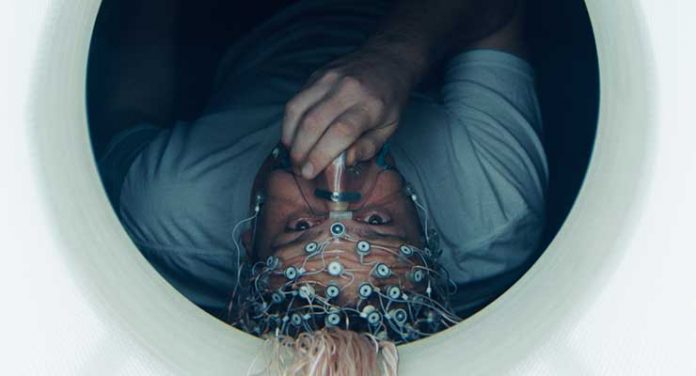
After Will prevents Isla from drowning herself in the ocean, she becomes another resident at the Harbor “halfway house.” Gradually Will and Isla begin to bond and reveal their backstories to each other: Will had a near-death experience as a child and Isla’s five-year old son drowned. There are gradual hints that the pair might have had some past connections but it will take the rest of the film to reveal them.
[envira-album id=”98895″]
Dr. Harbor’s afterlife experiments culminate in the construction of a device to record what the dead see in the afterlife. Rather than waiting for another suicide victim to appear, the good doctor sends Toby to the morgue where he “borrows” a recently deceased person to test Harbor’s recording machine. When the dead man is connected by numerous sensors and wires to the memory machine, the screen remains disappointingly blank. It appears that Will deliberately sabotaged the experiment by removing a wire from the unit. When everyone has left the lab, he replaces the wire and views a recording of some of the corpse’s last memories, and begins to search for the man’s identity and his survivors.
Struggling with memories of his mother’s suicide, years before, Will shares his “memory video” with Isla and she attempts to convince him that his father’s efforts to resurrect afterlife memories are bogus. Does the device really work and if it does work does it reveal what people experience after death? The Discovery probes some deep-seated existential questions but never gets much below their surface. Matters are not helped by the extremely deliberate pace that writer/director McDowell applies to the storyline. Perhaps the best aspects of this film are cinematographer Sturla Brandth Grøvlen’s seaside vistas (filmed in Newport, Rhode Island). This film confuses rather than clarifies what constitute the realities of our lives and whether time has multiple parallel dimensions through which we keep recycling. A cinematic premise that seemed quite promising and was given to a cast of veteran actors who have been in some very good films, The Discovery ends up as a frustrating sci-fi/quasi-philosophical film that runs out of gas well before its muddled conclusion.
The Discovery is currently streaming exclusively on Netflix.
[youtube httpss://www.youtube.com/watch?v=n3rkZQpgK_c&w=697&h=392]
Be the first to leave a review.

